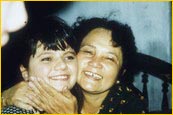

SUNDANCE OFFICIALLY RECOGNIZES ITS MARKET
by Susan Royal
For the past several years during his annual fireside chat with the Sundance Film Festival filmmakers, Sundance Institute President Robert Redford bemoaned the growth of the crassly commercial sales market activity which had been encroaching upon the festival experience. But, like it or not, clearly Sundance had long since become the most important film market -- official or unofficial -- for specialty films in the world. And so, with this year's edition, Sundance embraced this fact. Sundance 2002 will be remembered as the turning point -- the year Sundance organizers stopped resenting the business element and officially sanctioned it by opening the Sundance Film Festival Industry Center/Sales Office.
The office, which keeps track of the sale of film rights and territories available, was designed to assist the filmmakers' sales efforts. Buyers and sellers (and their reps) now have an official meeting place. Future plans for the Center include equipping the office with video screening rooms which will greatly facilitate buyers' schedules while at Sundance, and therefore increase each film's exposure.
 Blue Car |
|
The rights to many films were selling around $1 million -- among them Rebecca Miller's Personal Velocity, Love in the Time of Money (produced by Robert Redford), and Gus Van Sant's Gerry, starring Matt Damon and Casey Affleck. Fox Searchlight paid around $2.5. million for various rights to The Dancer Upstairs -- the directing debut of John Malkovich. But the stakes were really raised when Miramax shelled out $5 million for Gary Winick's Tadpole, a film whose buzz grew on a daily basis at the festival. The film, set in New York City, marks the feature film debut of Aaron Stanford in the lead as a precocious teen obsessed with older women and also stars Sigourney Weaver, Bebe Neuwirth and John Ritter.
Fox Searchlight paid $4 million for domestic and various other rights to Miguel Arteta's The Good Girl, starring Jennifer Aniston. The premiere of the film was delayed nearly half an hour by a wild photo op incident inside the Eccles Theater. Incredibly the paparazzi, apparently not content with taking photos of Jennifer Aniston and hubby Brad Pitt outside the theater as per normal premiere procedure, were actually allowed inside the theater. In addition to the paparazzi, it seemed as if half the audience pulled out either a camera or a piece of memorabilia (i.e. a video of Johnny Suede) for Brad Pitt to autograph. And just when the frenzy had begun to subside, enter Robert Redford, who strode over to the couple and hugged them, thereby triggering another frantic paparazzi surge against those of us unlucky enough to be sitting in the front rows. (The film didn't screen until a faction in the audience began clapping in protest.) One of those clapping was Roger Ebert, who later commented -- "Just what the world needs -- more Brad Pitt and Jennifer Aniston photos." Other than this snafu, this year's festival was the best organized and smoothest run edition yet. Today's Sundance Film Festival ranks highly among the world's major film festivals. By comparison, the Cannes Film Festival, which had already existed for decades when Sundance launched, does a better job controlling the paparazzi and protecting its stars, but has yet to establish anything close to the well-oiled machine of Sundance.
![]()
2002 SUNDANCE FILM FESTIVAL AWARDS
 Daughter From Danang |
|
Daughter From Danang, directed by Gail Dolgin & Vicente Franco and produced by Gail Dolgin
Dramatic Grand Jury Prize:
Personal Velocity, directed by Rebecca Miller and produced by Gary Winick, Lemore Syvan & Alexis Alexanian
 Amandla! A Revolution in Four Part Harmony |
|
Amandla! A Revolution in Four Part Harmony, directed by Lee Hirsch and produced by Lee Hirsch & Sherry Simpson
 Real Women Have Curves |
|
Real Women Have Curves, directed by Patricia Cardoso and coproduced by George LaVoo & Effie T. Brown
The World Cinema Audience Award:
Bloody Sunday, directed by Paul Greengrass and produced by Mark Redhead
The Last Kiss, directed by Gabriele Muccino and produced by Domenico Procacci
The Directing Award:
DOCUMENARY: Rob Fruchtman & Rebecca Cammisa for Sister Helen
DRAMATIC: Gary Winick for Tadpole
The Excellence in Cinematography Award:
DOCUMENTARY: Daniel B. Gold for Blue Vinyl
DRAMATIC: Ellen Kuras for Personal Velocity
The Freedom of Expression Award:
Amandla! A Revolution in Four Part Harmony, directed by Lee Hirsch and produced by Lee Hirsch & Sherry Simpson
The Waldo Salt Screenwriting Award:
Gordy Hoffman for Love Liza
The Documentary Jury bestowed a Special Jury Prize to:
How to Draw a Bunny, directed by John Walter and produced by Andrew Moore, and
Senorita Extraviada, directed & produced by Lourdes Portillo
The Dramatic Jury bestowed a Special Jury Prize for Originality to:
Secretary, directed by Steven Shainberg and produced by Steven Shainberg, Andrew Fierberg & Amy Hobby
The Dramatic Jury gave a Special Jury Prize for Ensemble Cast to:
Frankie G., Leo Minaya, Manuel Cabral, Hector Gonzalez, Julissa Lopez, Jessica Morales, & Panchito Gomez in Manito.
The Jury also presented a Special Jury Prize for Acting to:
America Ferrera & Lupe Ontiveros in Real Women Have Curves
The Latin American Jury awarded the Jury Prize in Latin American Cinema to:
The Trespasser, directed by Beto Brant and produced by Renato Ciasca & Bianca Villar
The Shorts Jury presented the Jury Prize in Short Filmmaking to:
Gasline, directed by Dave Silver
The Shorts Jury awarded Honorable Mentions to:
Bus 44, directed by Dayyan Eng
Drowning Lessons, directed by Gregory Kennedy
Morning Breath, directed by Brin Hill
No Dumb Questions, directed by Melissa Regan
The Parlor, directed by Geoffrey Haley
Stuck, directed by Jamie Babbit
The Sundance Online Film Festival Viewers Awards went to:
Carny Tales, by Scott Smith (New Forms)
Guerrilla News Network: Crack the CIA, by Stephen Marshall (Live Action)
Karma Ghost, by Billy Blob (Animation)
The Sundance/NHK International Filmmakers Award:
The Bleating of Sheep, Gjergj Xhuvani (Europe)
Cronicas, Sebastian Cordero (Latin America)
The Sleep Dealer, Alex Rivera (United States)
The Man Who Wipes Mirrors, Seisoku Kajita (Japan)
![]()
SUNDANCE ONLINE FILM FESTIVAL WINNERS CHOSEN
Audience Winners for the second annual Sundance Online Film Festival were chosen for each of the three categories of the SOFF -- New Forms, Live Action and Animation. Carny Tales, directed by Scott Smith was selected for the New Forms category, Guerrilla News Network: Crack the CIA, directed by Stephen Marshall was chosen for the Live Action category, and Karma Ghost, directed by Billy Blob was the winner of the Animation category. Online viewers were able to vote for the films over the website: www.sundanceonlinefilmfestival.org
site's duration December 20, 2001 - January 17, 2002.
Karma Ghost is a darkly comical story about the cumulative effects of bad karma. Guerrilla News Network: Crack the CIA provacatively sheds light on the covert history of CIA drug smuggling from Nicaragua to Arkansas and South Central Los Angeles. Carny Tales is a 360-degree interactive short about a group of gansters who kidnap a clairvoyant from a carnival to summon a dead mobster in order to find a double-crosser in their ranks.
The Animation category consists of films that showcase various animation techniques including flash animation, and computer graphics. The Live Action category includes films utilizing action and digital technology to create unique stories. The New Forms category features films pushing the boundaries of filmmaking and presentation. Atom films was the prinicipal sponsor.
![]()
SUNDANCE NHK AWARDS GIVEN
The Sundance Institute and Japanese broadcaster NHK have announced the three recipients of this year's Sundance/NHK International Filmmakers Award, which was created in 1996 to support the next generation of filmmakers from four different regions: the United States, Japan, Europe and Latin America.
Receiving a $10,000 cash award and a guarantee from NHK to purchase the Japanese TV broadcast rights upon completion of their next project are: Albanian filmmakers Gjergj Xhuvani for The Bleating of Sheep, Ecuadorian filmmaker Sebastian Cordero for Cronicas, New York's Alex Rivera for The Sleep Dealer and Japan's Seisoku Kajita for The Man Who Wipes Mirrors.
Past recipients include Walter Salles for Central Station and Rodrigo Garcia for Things You Can Tell Just by Looking at Her.
![]()
Inside Film Home | News & Views | Film Fests by Month
Screenwriting | Past Articles
All Inside Film logos, artwork, stories, information and photos are
© 1997-2020 Inside Film Magazine. All rights reserved.
Do not duplicate or distribute in any form. All other logos,
artwork and photos are © their individual owners.